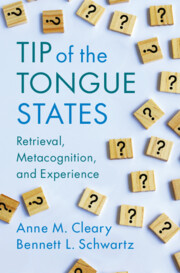Book contents
- Tip of the Tongue States
- Tip of the Tongue States
- Copyright page
- Contents
- Figures and Table
- Preface
- Chapter 1 Introduction and History of Research on Tip-of-the-Tongue States
- Chapter 2 Methodology
- Chapter 3 Tip-of-the-Tongue States in the Lab and in the World
- Chapter 4 Tip-of-the-Tongue State Etiology
- Chapter 5 Phenomenology
- Chapter 6 Flipping the Script
- Chapter 7 It’s Not All Bad
- Chapter 8 Tip-of-the-Tongue States Early and Late in Life
- Chapter 9 Toward an Understanding of the Neural Basis of the Tip-of-the-Tongue Experience
- Chapter 10 Related Phenomena
- Chapter 11 Tying It All Together
- References
- Author Index
- Subject Index
Chapter 1 - Introduction and History of Research on Tip-of-the-Tongue States
Published online by Cambridge University Press: 26 May 2025
- Tip of the Tongue States
- Tip of the Tongue States
- Copyright page
- Contents
- Figures and Table
- Preface
- Chapter 1 Introduction and History of Research on Tip-of-the-Tongue States
- Chapter 2 Methodology
- Chapter 3 Tip-of-the-Tongue States in the Lab and in the World
- Chapter 4 Tip-of-the-Tongue State Etiology
- Chapter 5 Phenomenology
- Chapter 6 Flipping the Script
- Chapter 7 It’s Not All Bad
- Chapter 8 Tip-of-the-Tongue States Early and Late in Life
- Chapter 9 Toward an Understanding of the Neural Basis of the Tip-of-the-Tongue Experience
- Chapter 10 Related Phenomena
- Chapter 11 Tying It All Together
- References
- Author Index
- Subject Index
Summary
This book is a scientific discussion of tip-of-the-tongue (TOT) states. First, the TOT state is a subjective experience – a feeling. Second, the feeling is about retrieval. The TOT state is a feeling that we can or will remember something. Brown and McNeill (1966) introduced the term “prospecting” into the language of TOT state research, which meant presenting rare-word definitions to participants and asking them to identify the word for each, and when unable to do so, assessing if they were in a TOT state for it. Brown and McNeill showed that TOTs can be captured in the lab, and that TOTs are accurate at predicting later memory performance. They set the stage for the next fifty-plus years of research on TOTs. Subsequent models focused on both how retrieval breaks down during a TOT state and what causes the subjective experience of a TOT state.
Keywords
Information
- Type
- Chapter
- Information
- Tip of the Tongue StatesRetrieval, Metacognition, and Experience, pp. 1 - 18Publisher: Cambridge University PressPrint publication year: 2025
